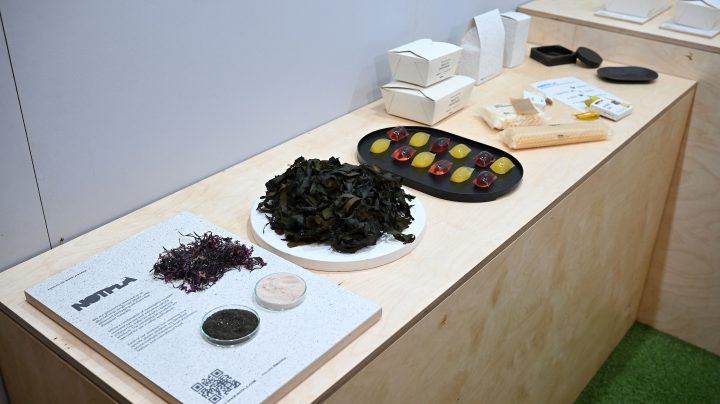
Seaweed and onion skins: British companies look to natural products to replace plastic
Seaweed and onion skins: British companies look to natural products to replace plastic

The British government has just unveiled a far-reaching ban on single-use plastic to combat a worsening pollution problem.
Much of the plastic discarded by the public winds up in rivers, streams and oceans, where it can remain for centuries, choking wildlife and ruining natural habitats. The British ban will mostly affect takeaway food outlets in England by prohibiting plates, trays, bowls and cutlery made of plastic, as well as certain types of polystyrene cups.
That’s good news for a London-based startup called Notpla — short for Not Plastic. The company, which in December was among the winners of the second annual environmental Earthshot Prize in Boston, is one of a number of businesses hoping to profit from the growing unpopularity of plastic. It’s created a type of biodegradable packaging that uses a rather surprising — but widely available — material: seaweed.
“Seaweed has been around for billions of years, and so nature recognizes the structure and is able to break it down readily,” Notpla’s commercial director, Tristan Kaye, told Marketplace during a recent tour of the company’s small factory in the East End of London.
“If our materials find their way into the natural environment, nature will be able to break them down,” he said.
The process usually takes only a few weeks. It’s believed that plastic, on the other hand, never fully decomposes.
The company is making three basic products in its small factory: seaweed-coated cardboard boxes for food retailers, seaweed film for wrapping food or cosmetics, and small sachets containing a drink, like water, alcohol or fruit juice. You just pop the sachet into your mouth and chew. The seaweed itself has been rendered tasteless, but it’s perfectly edible.

It’s also plentiful and comparatively cheap, said Notpla co-founder Rodrigo Garcia.
“It doesn’t need farmland. It doesn’t need freshwater. It doesn’t need fertilizer. It doesn’t need too much human intervention. It grows in the sea, and you just leave it to grow. There’s so much of it, it would be really hard to run out of seaweed,” he said.
Seaweed isn’t the only alternative to plastic. Another small British company is using palm leaves, and another uses bamboo. Meanwhile, Renuka Ramanujam, a designer based in Scotland, has hit on perhaps the most curious replacement material for plastic wrapping: onion skins.
“They’re robust and they contain all sorts of natural waxes that make them ideal for packaging,” Ramanujam said. “And they have antimicrobial components in them and antioxidants that will help keep food fresh. That could be really helpful in reducing food waste by extending supermarket shelf life. So for packaging, that could be absolutely huge.”
Her company, Huid, is still at the research and development stage, but Ramanujam reckons she’ll have a prototype by the end of the year.
Notpla and its seaweed products are much further along, with a staff of around 70. According to Rodrigo Garcia, it has paying customers in eight European countries. But he isn’t claiming that he’s wrapped up the problem of plastic packaging yet.
Garcia hopes Notpla breaks even before it burns through what’s left of its $19 million worth of capital in 18 months’ time. But ultimately — whether it’s seaweed, onion skins, bamboo or palm leaves — alternative packaging has some way to go. According to the Earth Day environmental campaign, the world produced 580 billion plastic bottles in 2021 and used 5 trillion plastic bags last year.
There’s a lot happening in the world. Through it all, Marketplace is here for you.
You rely on Marketplace to break down the world’s events and tell you how it affects you in a fact-based, approachable way. We rely on your financial support to keep making that possible.
Your donation today powers the independent journalism that you rely on. For just $5/month, you can help sustain Marketplace so we can keep reporting on the things that matter to you.

















